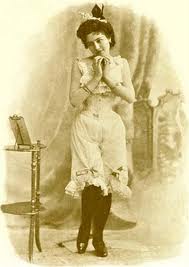Do you know your brand names from your common nouns? Check your knowledge here …
http://www.mentalfloss.com/blogs/archives/93858#ixzz22IJ7b5Aw
–brought to you by mental_floss!
1. You might think you’re riding around on a Jet Ski, but if it’s not made by Kawasaki Heavy Industries, it’s just a personal watercraft.
2. Bubble Wrap is probably the greatest contribution made to our society by Sealed Air Corporation, which they rightly trademarked.
3. The term Onesies, referring to infant bodysuits, is owned by Gerber Childrenswear. According to their website, the trademark is aggressively enforced. (Twosies and Funzies also belong to Gerber.)
4. Jacuzzi is not only a brand of hot tubs and bathtubs; they also make mattresses and toilets.
5. The Crockpot, a brand name for the slow cooker, was originally developed as a beanery appliance.
6. Fluffernutter is a registered trademark of the makers of Marshmallow Fluff, Durkee-Mower, Inc.
7, 8 & 9. Frisbee is currently owned by WHAM-O, but a legal battle to make this word and several others generic is underway. In 2010, Manley Toys Ltd. challenged WHAM-O, arguing that the terms Frisbee, Hula Hoop and Slip’n Slide have already become generic in the public lexicon. Personally, I think Ultimate Flying Disc sounds cooler than Ultimate Frisbee anyway.
10. Chapstick is a brand name of lip balm produced by Pfizer. In the event that you find yourself enjoying this product too much, websites dedicated to helping Chapstick addicts are available.
11. The perfect time to remind a friend or family member that Kleenex is a brand name for a tissue is right when they are desperately begging you to hand them one.
12. Ping-Pong was trademarked in 1901 as a brand of table tennis products named for the sound the ball makes when it hits the table.
13. On their website, Microsoft suggests that unless you are using their software, your PowerPoint is a “presentation graphics program.”
14. When Q-tips were originally released, they were called Baby Gays. The name was changed to Q-tips—the “Q” standing for quality—in 1926. Although they have changed hands several times since then, Unilever owns the brand today.
 15. Two hockey-player brothers designed Rollerblade inline skates from a pair of old roller skates in 1979. They were the only brand of inline skates until the mid-eighties, when several other companies emerged.
15. Two hockey-player brothers designed Rollerblade inline skates from a pair of old roller skates in 1979. They were the only brand of inline skates until the mid-eighties, when several other companies emerged.
16. According to legend, Scotch tape earned its name when a frustrated customer told a 3M scientist to “take it back to your Scotch bosses and tell them to put more adhesive on it.” Today, Scotch “Magic Tape” is only manufactured in one place in the world: Hutchinson, Minn.
17. The permanent marker was invented in 1956, but the Sharpie wasn’t introduced until 1964. Today, the products are almost synonymous with one another.
18. In 1899, Pearle Wait sold his recipe for Jell-O to Orator Woodward for $450. In 1902, sales for the product were around $250,000. Today, the gelatin dessert is owned by Kraft.

19. Tupperware is a brand that got its name from its creator, Earle Silas Tupper.
20. George de Mastreal invented Velcro when he discovered that burrs stuck to matted dog fur. Today, it is the world’s most prominent brand of hook and loop fasteners.
21. Weed Eater is owned by Husqvarna Outdoor Products.
22. Don’t ask BIC what’s in their line of correction fluid. The exact ingredients of Wite-out are confidential.
23. Johnson & Johnson manufactured gauze and adhesive tape separately until Earle Dickinson had the idea to combine them to create Band-Aids for his accident-prone wife.
24. The Zamboni is an ice resurfacer named after its inventor, Frank Zamboni.
25. TASER is a trademark of TASER International, and shouldn’t technically be used as a verb. To be fair, “Don’t hit me with that electroshock weapon, bro!” is probably hard to shout under duress. Bonus fact: TASER is an acronym. It stands for “Thomas A. Swift’s Electric Rifle.”
26. JC wrote that Dumpster is a brand name, which is true, although the word has become largely genericized and the trademark is not widely enforced. The Dumpster got its name from the Dempster Brothers Inc., who combined their name with the word “dump” to create the Dempster Dumpster.
27. Novocain is actually the brand name of Procaine Hydrochloride owned by Hospira Inc. Thanks to H.D. for the info!
 28. Thanks to Krebscy, I will never again make the mistake of offering my guests a Popsicle, a registered trademark of Unilever. Like many great things in life, the Popsicle was invented by accident. As the story goes, one winter night in 1905, 11-year-old Frank Epperson left a mixture of soda and water with a stick in it on his porch. Almost 20 years later, Frank began selling his creation at a lemonade stand he was running and the treat has been popular ever since.
28. Thanks to Krebscy, I will never again make the mistake of offering my guests a Popsicle, a registered trademark of Unilever. Like many great things in life, the Popsicle was invented by accident. As the story goes, one winter night in 1905, 11-year-old Frank Epperson left a mixture of soda and water with a stick in it on his porch. Almost 20 years later, Frank began selling his creation at a lemonade stand he was running and the treat has been popular ever since.
Today, Unilever recommends that you call generic frozen pops on a stick “pops,” “ice pops” or “freezer pops”. Although, depending on where you’re from, offering someone a “pop” could get very confusing.
29. Everyone knows Post-its, a trademark of 3M, were not the invention of Romy and Michele. A very different duo is responsible—Dr. Spencer Silver invented the adhesive in 1968 and scientist Art Fry thought up a practical use for it in 1974. In 1980, Post-its were available for sale. Thanks to Ken!
30. The Ouija board was first introduced by Elijah Bond in 1890 as a practical way to communicate with spirits, making dealing with a pesky ghost much more convenient. Today, it is trademark of Hasbro Inc. Thanks to Romeo Vitelli passing this on!
31. Vic brought to our attention that Plexiglas, which got its start in World War II aircraft canopies, has since become the better-known name for acrylic glass or poly(methyl methacrylate).
32. No matter how many picnics you’ve been to or how much time you spend at the water cooler, you’ve never had a drink out of a Styrofoam cup. Expanded Polystyrene is the generic name for the material that we typically think of as Styrofoam. The brand is a trademark of the Dow Chemical Company that is made in sheaths for construction projects and is never named in the shape of a plate, cup or cooler. Thanks to Matt for the tip!
 33. Geekinsight, which I hope is a family name, pointed out that Thermos is a registered trademark. Although the Thermos was invented in 1892, it wasn’t paired with a lunch box until 1953. The set, which originally featured a picture of Roy Rogers, sold more than 2 million units in the first year.
33. Geekinsight, which I hope is a family name, pointed out that Thermos is a registered trademark. Although the Thermos was invented in 1892, it wasn’t paired with a lunch box until 1953. The set, which originally featured a picture of Roy Rogers, sold more than 2 million units in the first year.
34. Robert Chesebrough invented Vaseline, now a registered trademark of Unilever, when he was 22 and he observed oil workers smearing residue from drills on their skin to heal wounds. Twenty years later, in 1880, Vaseline was selling throughout the United States at the rate of one jar a minute. Thanks for the info, Ken!
35. X-acto began in 1917 as a medical company that created syringes. Eventually, they began creating surgical scalpels that evolved into the hobby knives that we associate with X-acto. As Patrick told us, X-acto is a brand and a division of Elmer’s.








 15. Two hockey-player brothers designed Rollerblade inline skates from a pair of old roller skates in 1979. They were the only brand of inline skates until the mid-eighties, when several other companies emerged.
15. Two hockey-player brothers designed Rollerblade inline skates from a pair of old roller skates in 1979. They were the only brand of inline skates until the mid-eighties, when several other companies emerged.
 28. Thanks to Krebscy, I will never again make the mistake of offering my guests a Popsicle, a registered trademark of Unilever. Like many great things in life, the Popsicle was invented by accident. As the story goes, one winter night in 1905, 11-year-old Frank Epperson left a mixture of soda and water with a stick in it on his porch. Almost 20 years later, Frank began selling his creation at a lemonade stand he was running and the treat has been popular ever since.
28. Thanks to Krebscy, I will never again make the mistake of offering my guests a Popsicle, a registered trademark of Unilever. Like many great things in life, the Popsicle was invented by accident. As the story goes, one winter night in 1905, 11-year-old Frank Epperson left a mixture of soda and water with a stick in it on his porch. Almost 20 years later, Frank began selling his creation at a lemonade stand he was running and the treat has been popular ever since. 33. Geekinsight, which I hope is a family name, pointed out that Thermos is a registered trademark. Although the Thermos was invented in 1892, it wasn’t paired with a lunch box until 1953. The set, which originally featured a picture of Roy Rogers, sold more than 2 million units in the first year.
33. Geekinsight, which I hope is a family name, pointed out that Thermos is a registered trademark. Although the Thermos was invented in 1892, it wasn’t paired with a lunch box until 1953. The set, which originally featured a picture of Roy Rogers, sold more than 2 million units in the first year.
